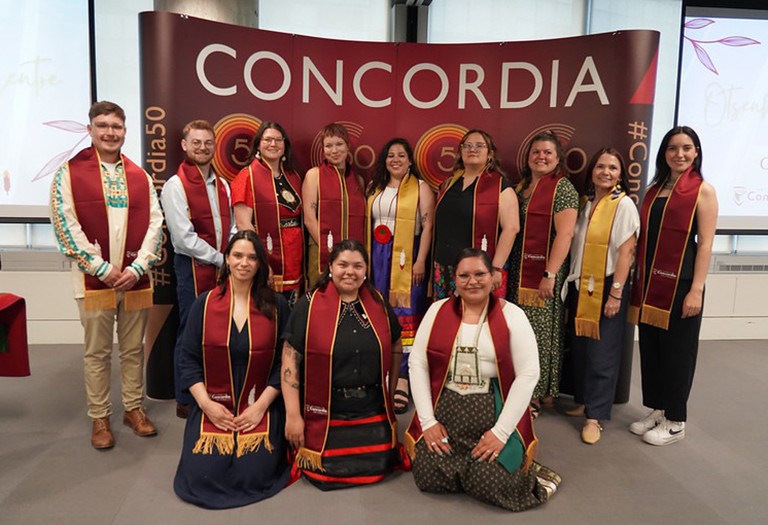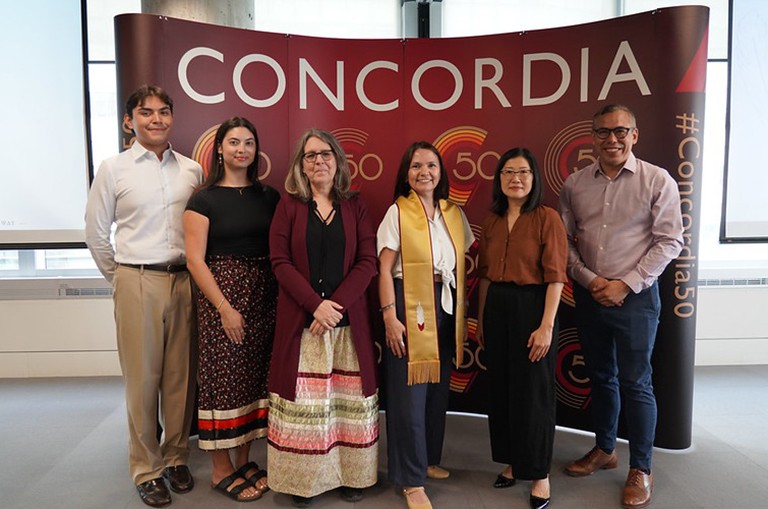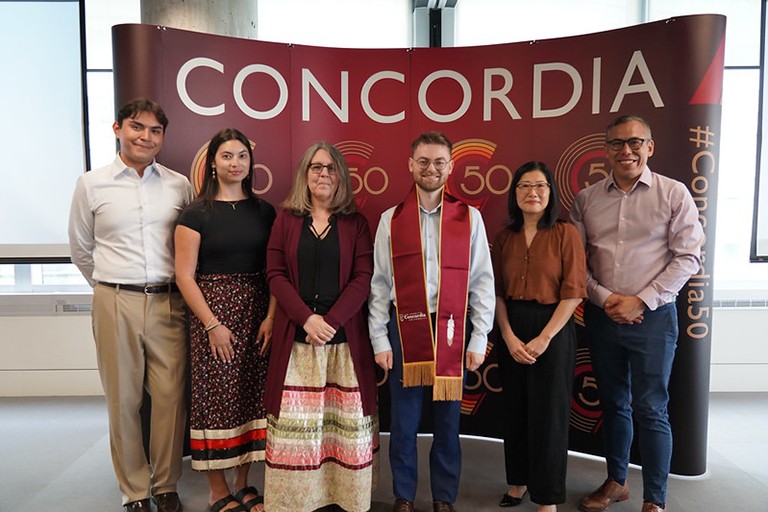Concordia’s Otsenhákta Student Centre celebrates Indigenous grads and their community contributions

Concordia’s Otsenhákta Student Centre hosted its annual Indigenous Graduation Celebration on June 6, honouring First Nations, Métis and Inuit graduates from across the university.
This year’s event recognized graduates at all levels of study, from the Kaié:ri Nikawerá:ke Indigenous Bridging Program to PhD graduates. Family, friends and community members gathered as each graduate was presented with a stole to wear at their faculty convocation. Kanien'kehá:ka Elder Tom Dearhouse opened and closed the event, finishing with a round dance where participants joined hands and moved in a circle in celebration.
“The round dance was a special way to end the night,” says Savannah Matteini-Gabriel, Indigenous student engagement coordinator. “We all came together: grads, faculty, family, community members. It was really nice to see the smiles on everyone’s faces.”
Each year, one graduate and one undergraduate student are invited to reflect on their journeys. This year’s speakers were Natasha Ita MacDonald, MA 01, PhD 25, and Aidan Tecumsah Condo, BA 25.
“It’s really inspiring when I see the graduates and hear their stories of resilience, but also where they’re going, and how they’re leading the charge by being mentors,” says Allan Vicaire, senior advisor of Indigenous Directions.
“Our graduates are redefining their education, not for them, but for the communities that they come from.”
 From left: Sebastian Bob, Savannah Matteini-Gabriel, Manon Tremblay, Natasha Ita MacDonald, Bo Kim, Allan Vicaire.
From left: Sebastian Bob, Savannah Matteini-Gabriel, Manon Tremblay, Natasha Ita MacDonald, Bo Kim, Allan Vicaire.
Natasha Ita MacDonald
MacDonald is Inuk, originally from Kuujjuarapik in Nunavik. After a 20-year career empowering Indigenous professionals, she returned to Concordia to refocus on her passion for education.
Her PhD research explores how Inuit traditional knowledge can maintain and protect Inuktitut and Inuit culture when community members in Nunavik often use must use English, which is still the second language in Nunavik.
In March, she defended her dissertation at the Nunavik Sivunitsavut Centre, which offers a culturally-responsive postsecondary program for Inuit students in Montreal. MacDonald invited Inuit community members to attend, reframing the academic milestone as an opportunity to bring her research back to her community.
“I wanted Inuit people to see themselves in that space and understand the process, to demystify it,” she explains. “The process wasn’t just about me getting a degree. It was about showing my community that this is possible and that our ways of knowing matter.”
The defense opened with a qulliq ceremony, the lighting of a whale oil lamp. MacDonald took efforts to present her research so her Inuit audience could see the impact of their knowledge in her findings.
“I was giving results, sharing what Inuit had said to me. That was very powerful.”
Now, MacDonald is applying her doctoral research to a groundbreaking new project: building the action plan for the Inuit Nunangat University, the first Inuit-owned and -governed university in the Arctic, opening in 2030.
“We’re developing the university from a decolonized perspective, from the ground up,” she says. “Everything is being designed through Inuit ways of learning and knowing and being.”
MacDonald encourages future Indigenous students to design their programs to reflect their way of learning, their cultural knowledge.
“That’s what I want future students to know: it doesn’t have to be the same old way. We don’t have to fit in the same old mould.”
 Aidan Tecumsah Condo: “I knew if I’m going to be representing Indigenous Peoples, I wanted to get a better grasp on other Indigenous cultures and their ways of life.”
Aidan Tecumsah Condo: “I knew if I’m going to be representing Indigenous Peoples, I wanted to get a better grasp on other Indigenous cultures and their ways of life.”
Aidan Tecumsah Condo
Condo is Mi’kmaq from the community of Gesgapegiag in Gaspésie. From a young age, he knew he wanted to pursue law, specifically Indigenous and Aboriginal law. He chose Concordia for its First Peoples Studies program and to stay close to his community while connecting with Indigenous students from other nations.
“If I was going to be representing Indigenous Peoples, I wanted to get a better grasp on other Indigenous cultures and their ways of life,” he says. “At Concordia, there are Indigenous people from all corners of Canada: from the Prairies, from the West Coast, from the North. Even though we are different, we still have certain aspects in common. It was really nice to share that friendship.”
Condo combined his First Peoples Studies major with a Law and Society minor. This interdisciplinary combination allowed him to explore fields like political science, history, sociology and anthropology. “I got a really well-rounded education,” he says. This fall, he’ll begin law school at the University of Toronto.
He also took on leadership roles, working as a staff member at the Indigenous Directions Office and serving as community project chairperson for the Garnet Key Society. In that role, he led a campaign focused on Indigenous issues and organized events supporting organizations like Resilience Montreal.
Those experiences opened the door to what he calls “career-changing” opportunities, including shadowing a judge through the Court of Quebec Program, speaking on a panel with the Honourable Nicole Duval Hesler hosted by the Jurist-in-Residence program and presenting the Loyola Medal to the Honourable Murray Sinclair.
“I think what was even more important to me was being able to have a personal conversation with Sinclair. I was able to ask him for career advice, different questions I had about the field of law. That was a great moment.”
Condo encourages other students to step out of their comfort zone and for Indigenous students to connect with the Otsenhákta Student Centre to find opportunities and support along the way.
“Most of this would not have happened if I wasn’t comfortable being uncomfortable,” he says. “If you’re feeling a little doubtful, there are people you can talk to who will encourage you to try new things. My advice is: ‘Why not?’”
Celebrate Indigenous History Month.
Indigenous students: Connect with the Otsenhákta Student Centre.




